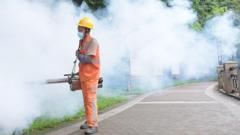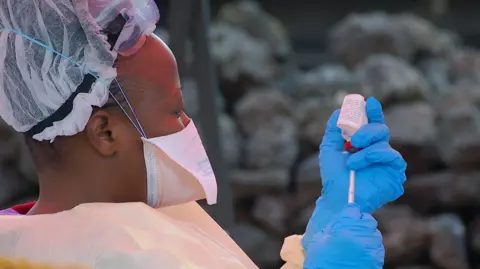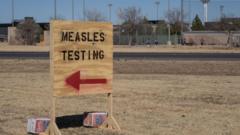In an alarming public health development, over 7,000 cases of the chikungunya virus have been confirmed in Guangdong province, China, since July, mirroring emergency responses seen during the Covid-19 pandemic. Foshan city is experiencing the most significant impact, where affected patients are now required to stay hospitalized, their beds protected with mosquito nets until they test negative or complete a week-long stay.
Chikungunya is transmitted through the bite of infected mosquitoes, leading to symptoms such as fever and debilitating joint pain that can linger for years. Despite being relatively uncommon in China, this outbreak reflects similar patterns observed in parts of South and Southeast Asia and Africa. In addition to Foshan, 12 other cities within the province have reported cases, with nearly 3,000 of these occurring in just the past week. The disease has also made its way to Hong Kong, marking its first case in a young boy who returned from Foshan.
Health authorities emphasize that chikungunya is not contagious and only spreads through mosquito bites. Thankfully, almost all of the reported cases so far have been mild, with 95% of patients recovering within a week. However, the unfamiliarity of the virus has stirred concern among the public, as evidenced by reactions on social media platforms.
In response to the outbreak, Guangdong authorities are taking "decisive and forceful measures" to curb further spread. Residents with any symptoms, including fever or joint pain, have been urged to seek immediate medical attention. Preventative strategies include the removal of stagnant water sources in homes, with fines of up to 10,000 yuan ($1,400) for non-compliance. Additionally, officials have launched initiatives such as releasing genetically modified "elephant mosquitoes" designed to combat smaller, disease-spreading mosquitoes and deploying fish that consume mosquito larvae in local water bodies.
Although some nearby cities had mandated 14-day home quarantines for travelers returning from Foshan, those measures were recently retracted. Public response has been mixed, with individuals drawing parallels between the current health protocols and those implemented during the pandemic, questioning their necessity given that the virus does not spread person-to-person.
Chikungunya was first identified in Tanzania in 1952 and has since spread to over 110 countries, primarily affecting populations in Africa and Asia. With no known cure but rare fatalities, proactive measures such as maintaining clean environments to disrupt mosquito breeding are vital in preventing further outbreaks, according to the World Health Organization.






















